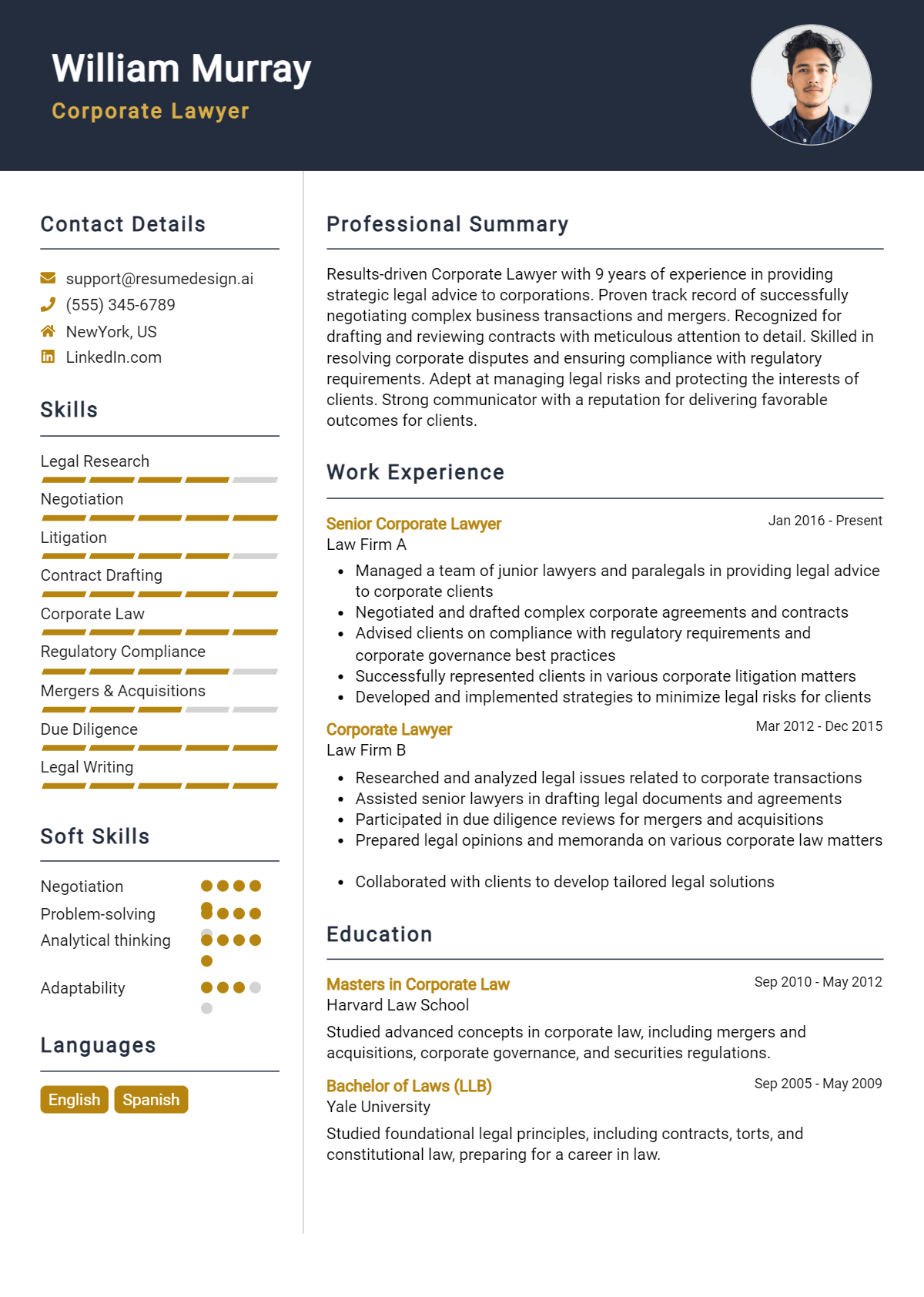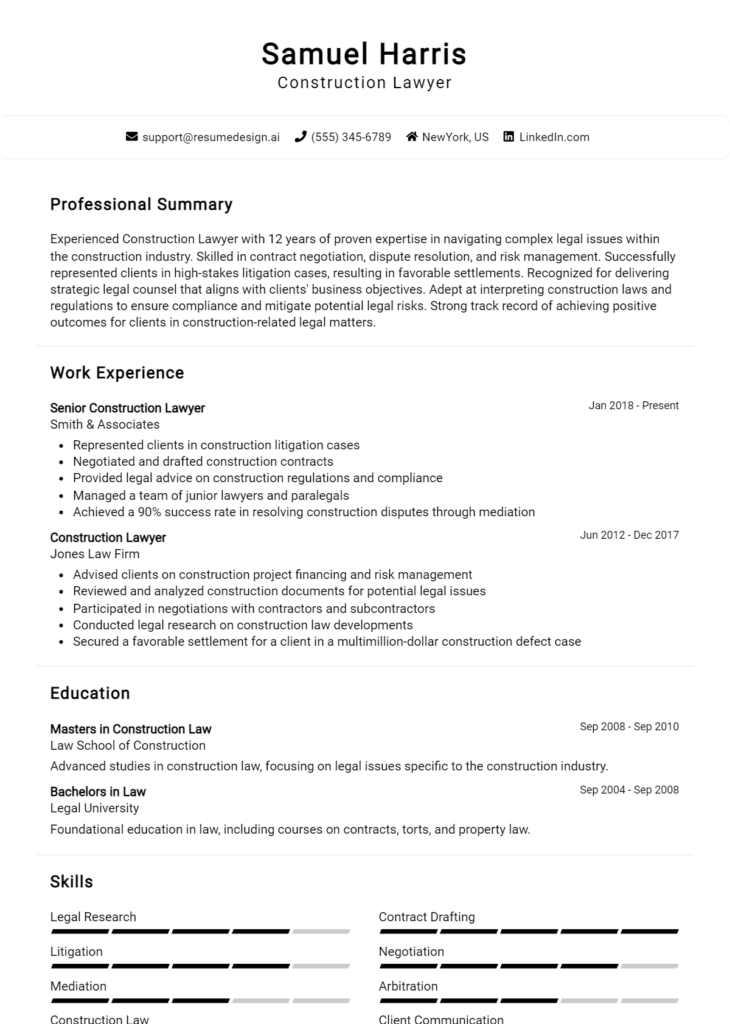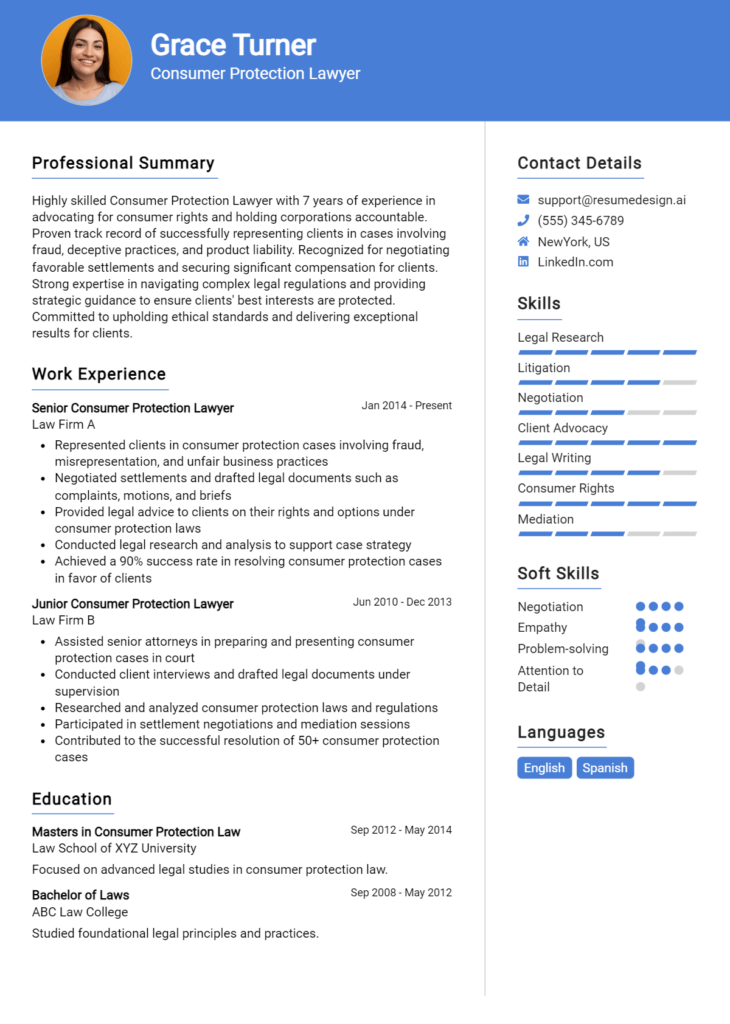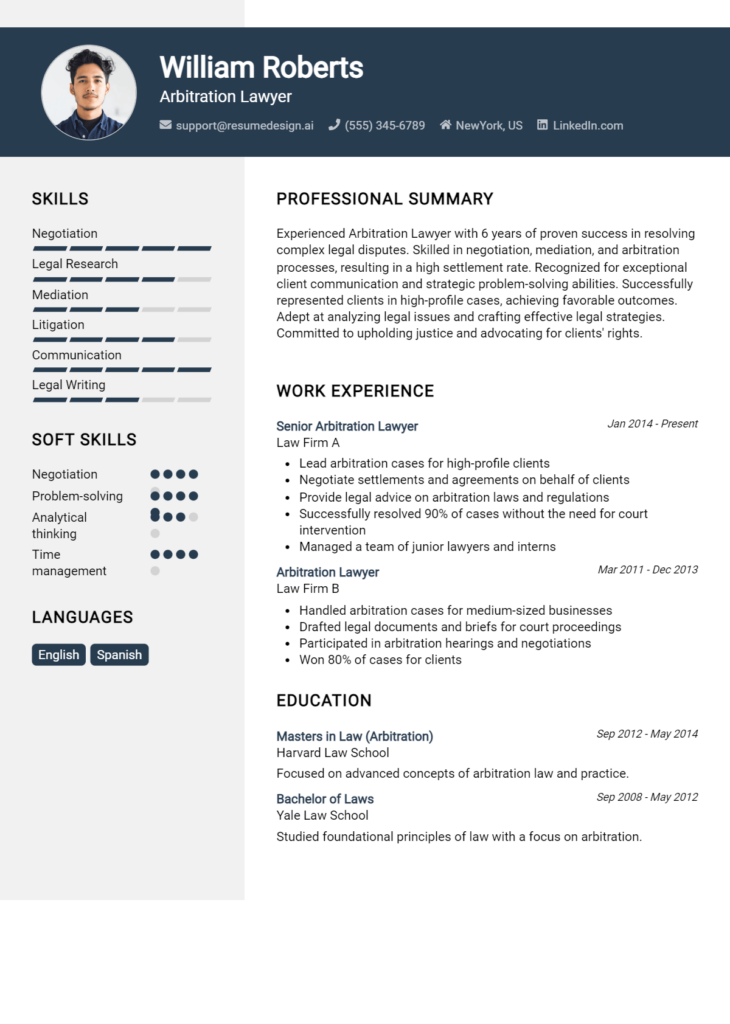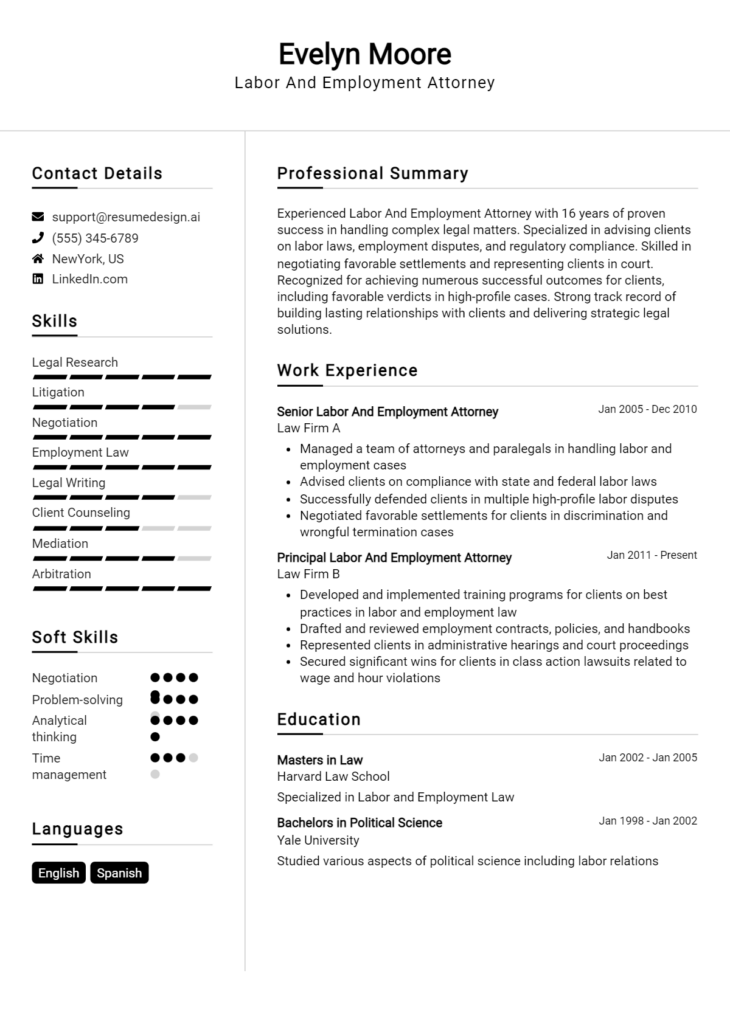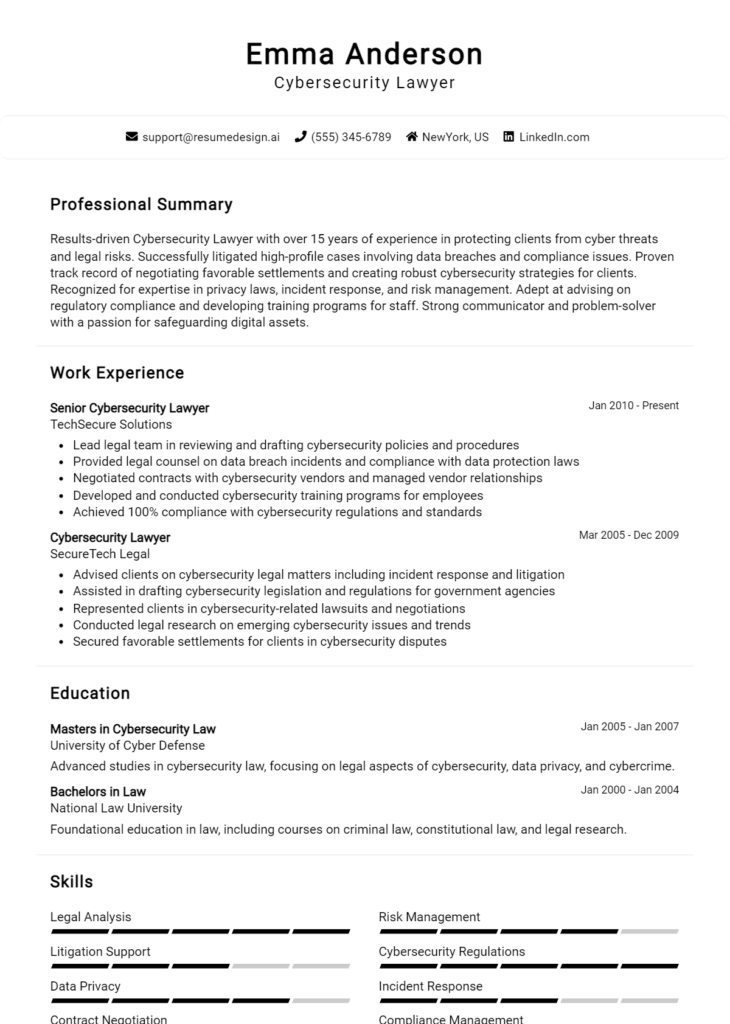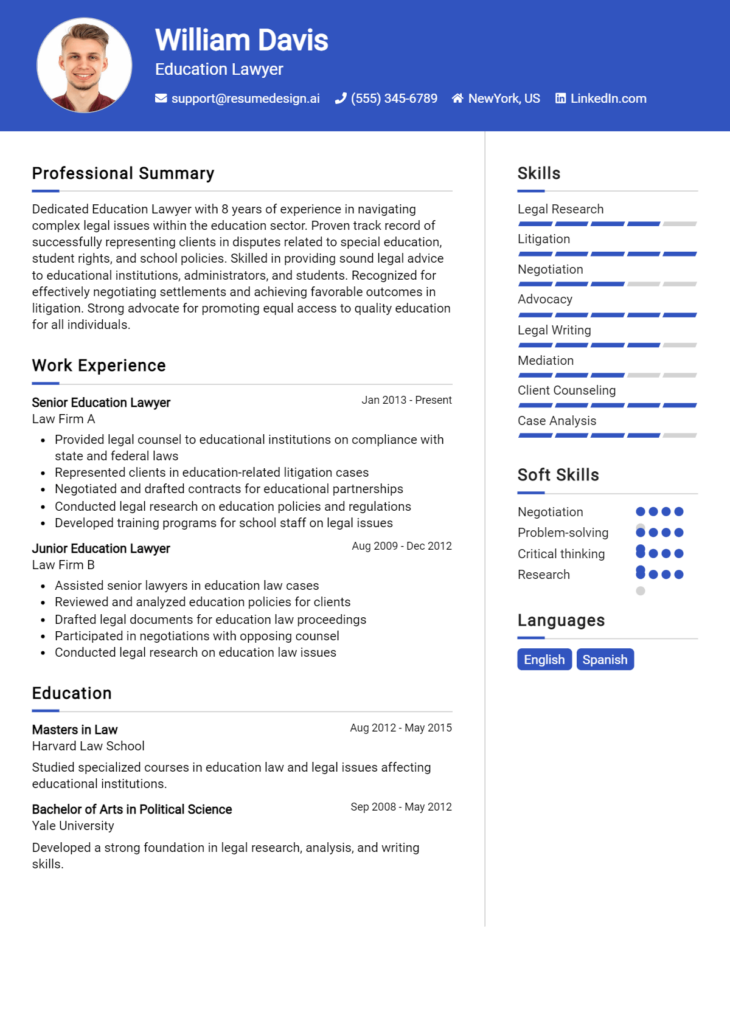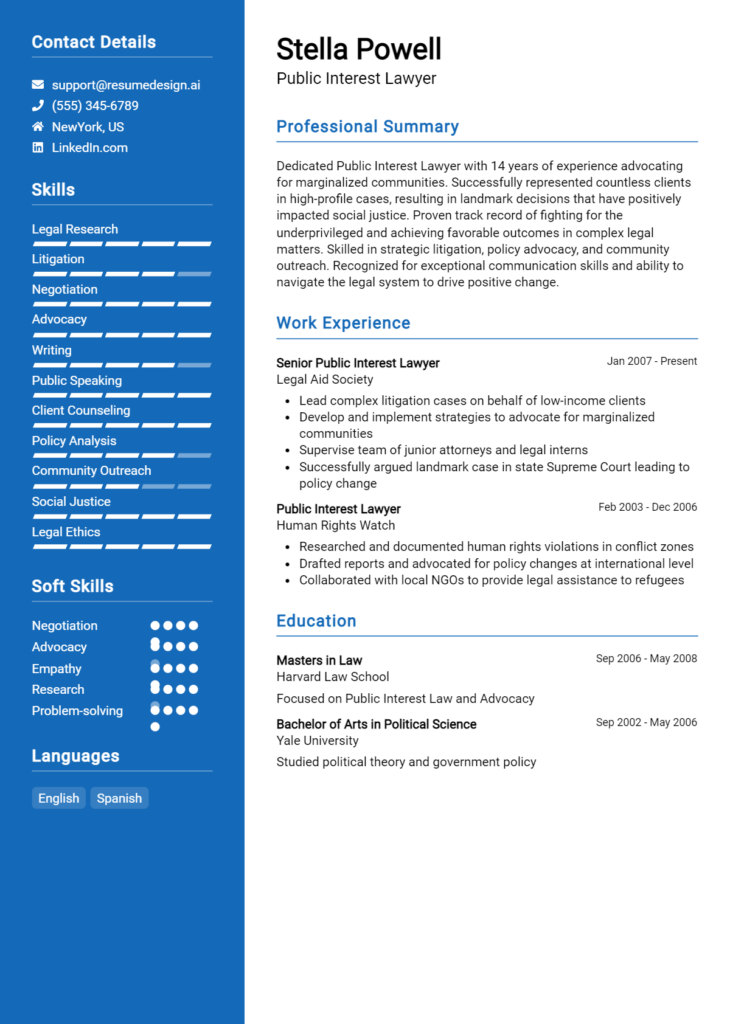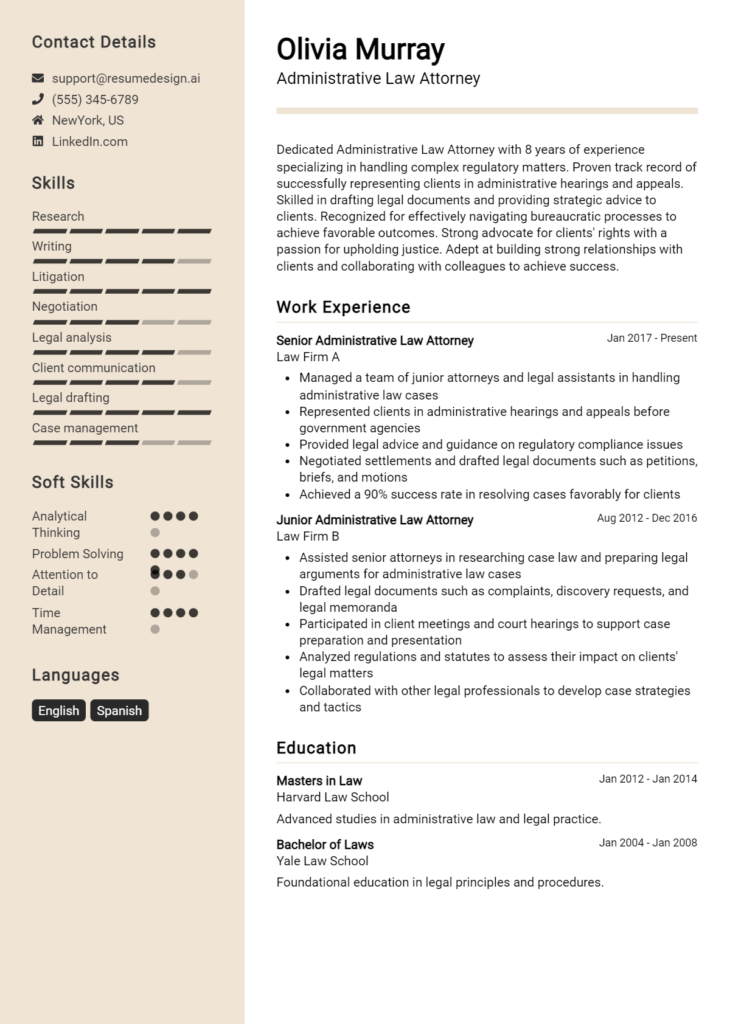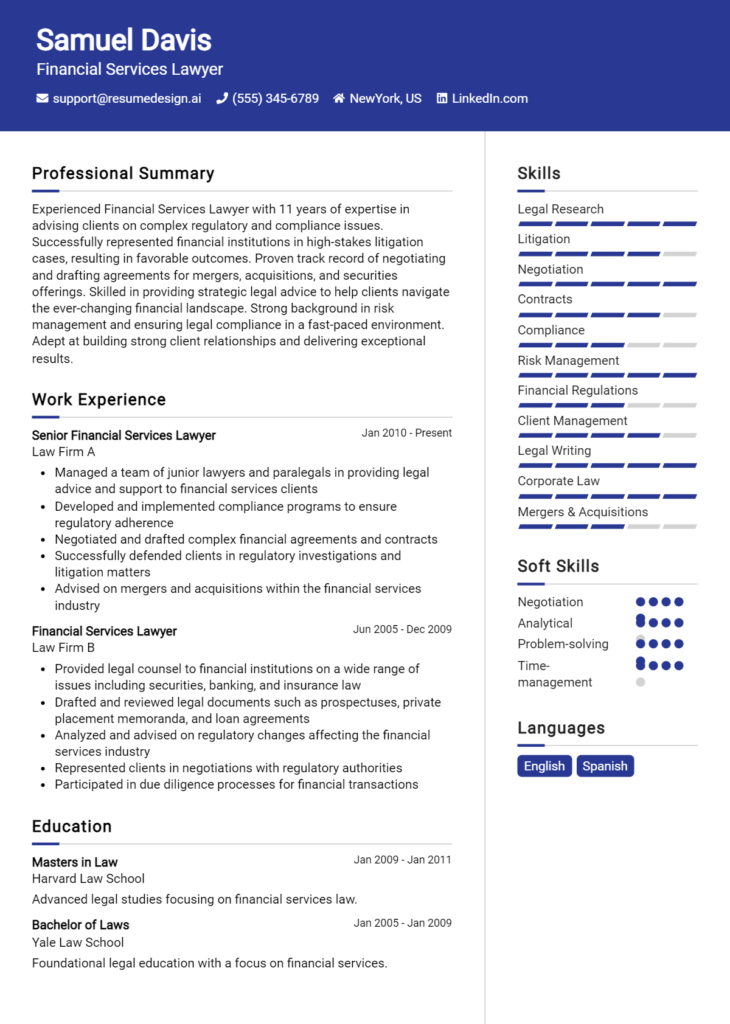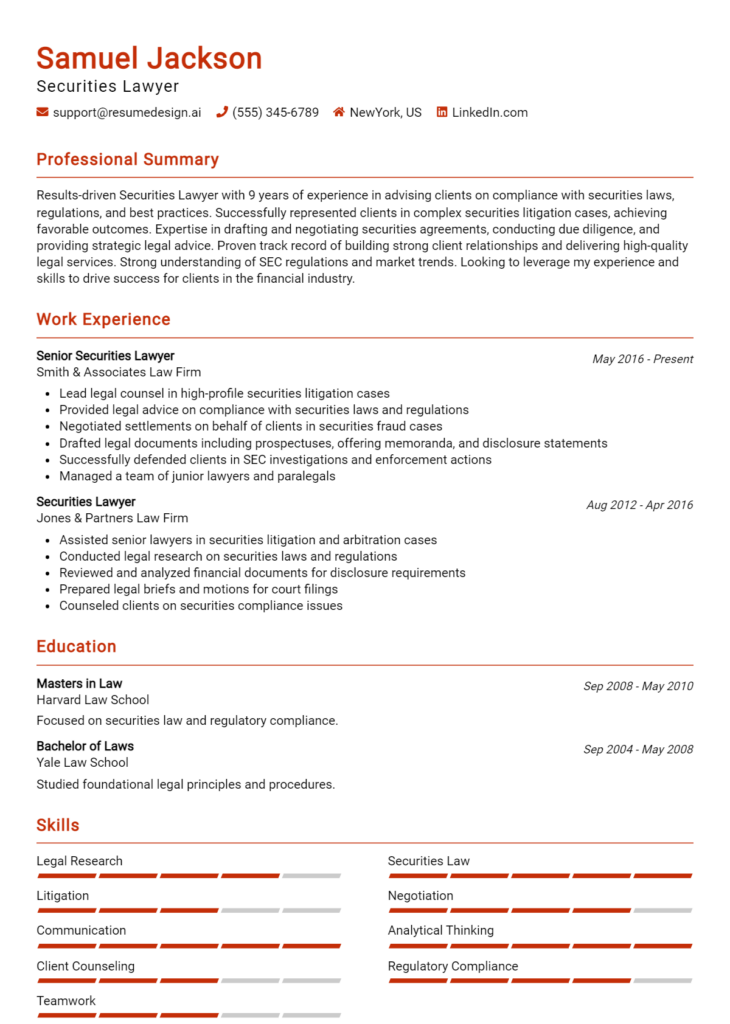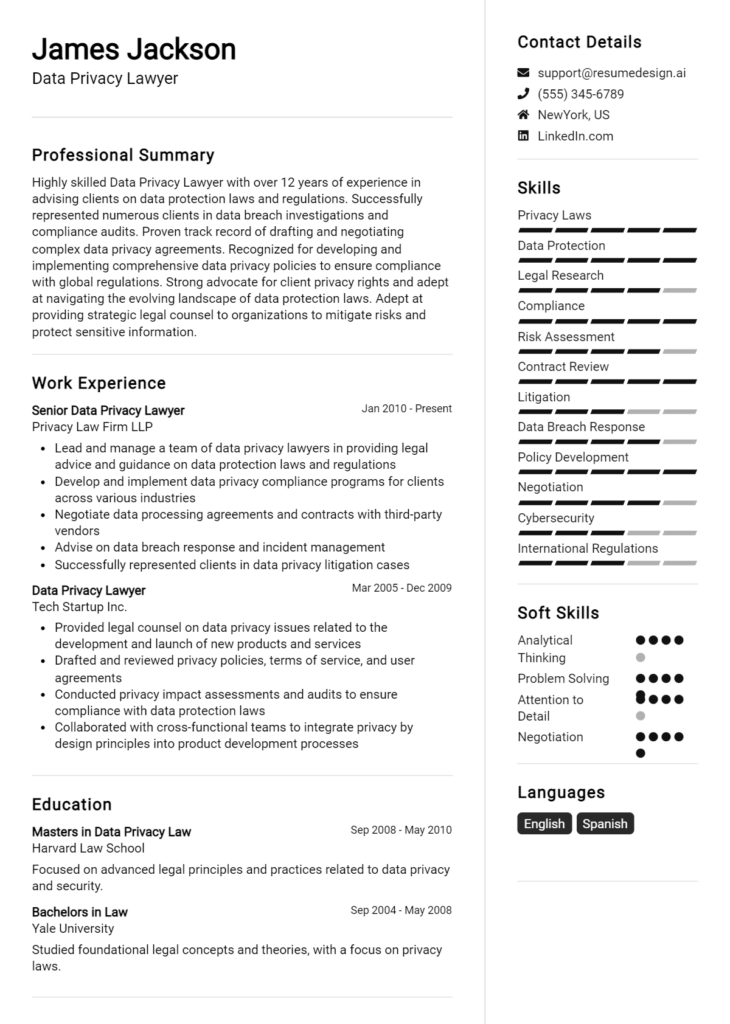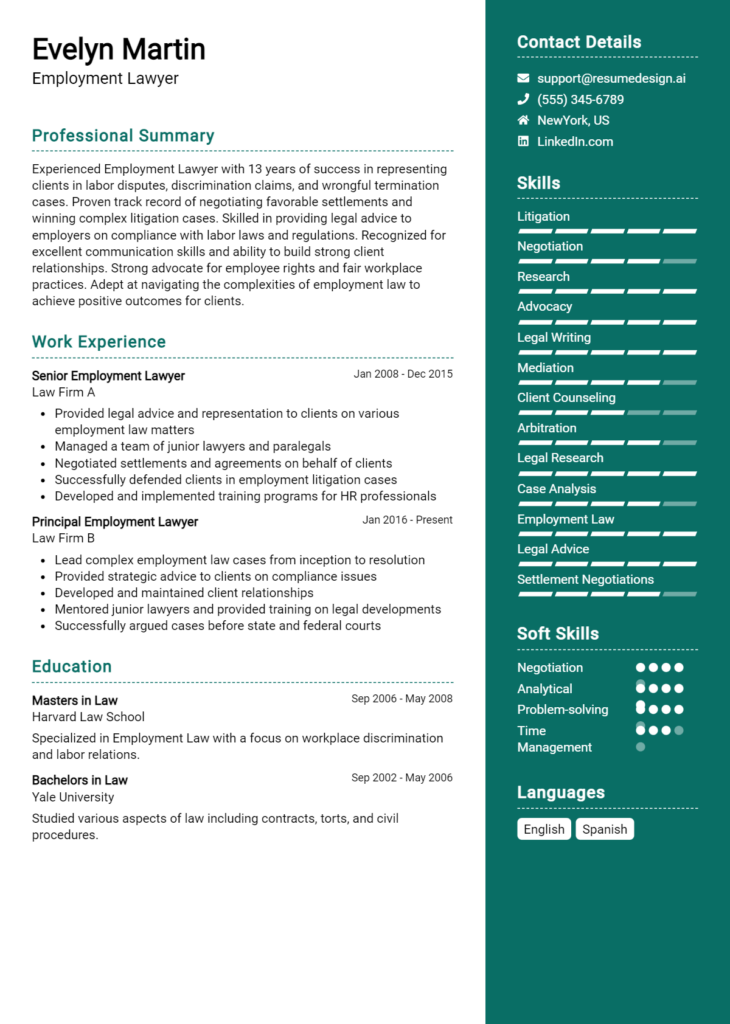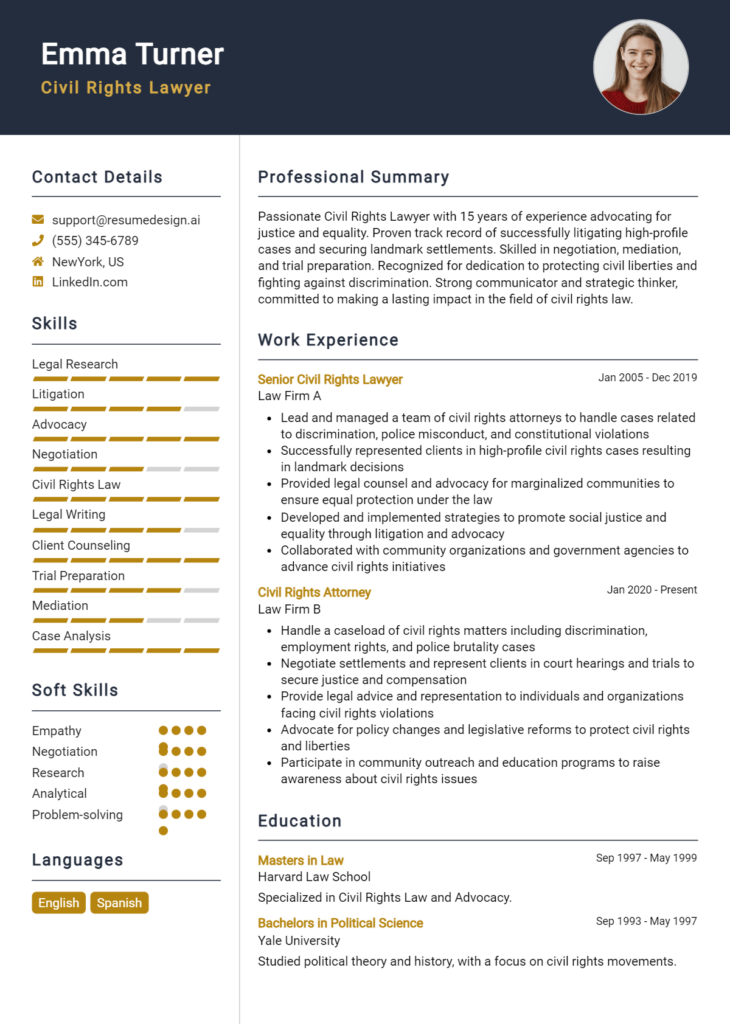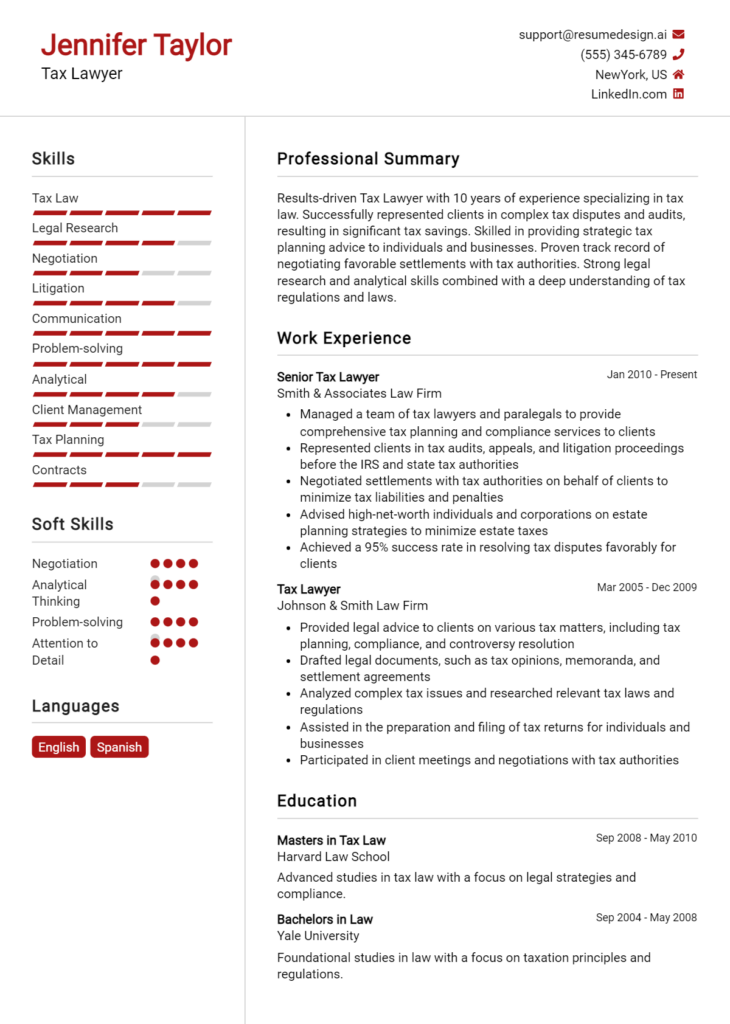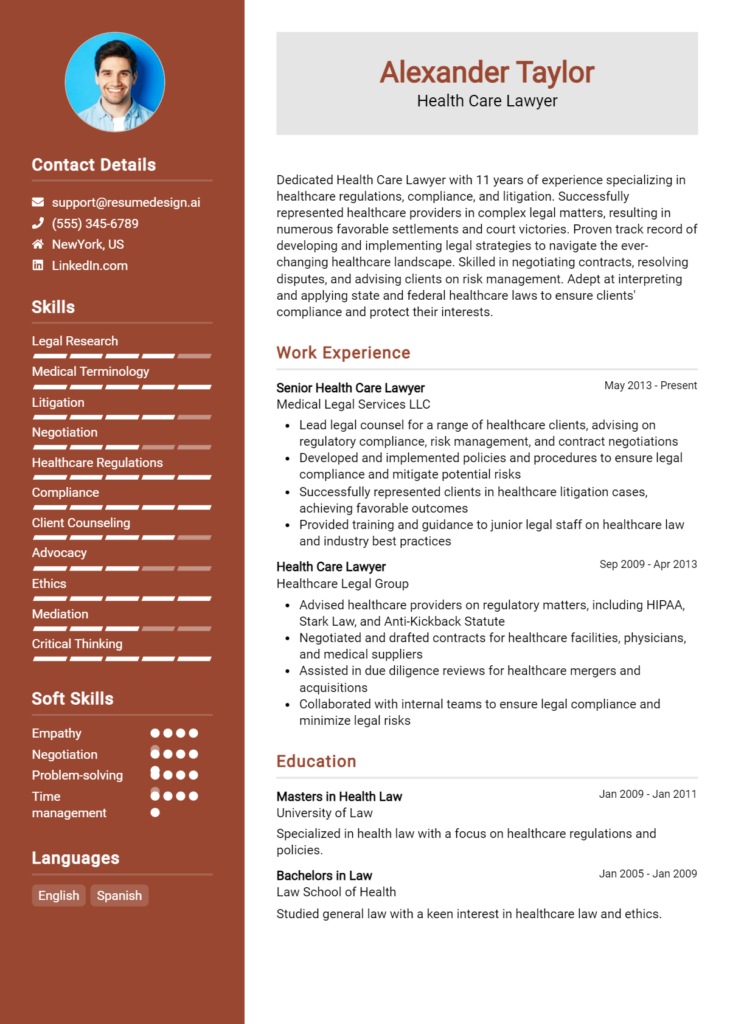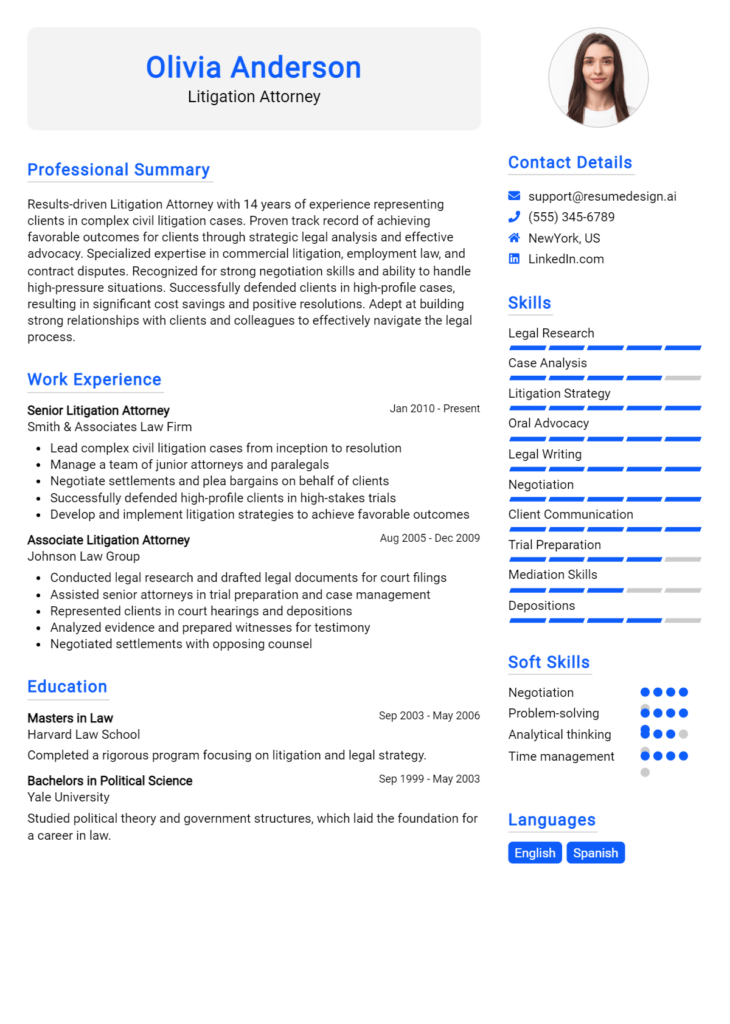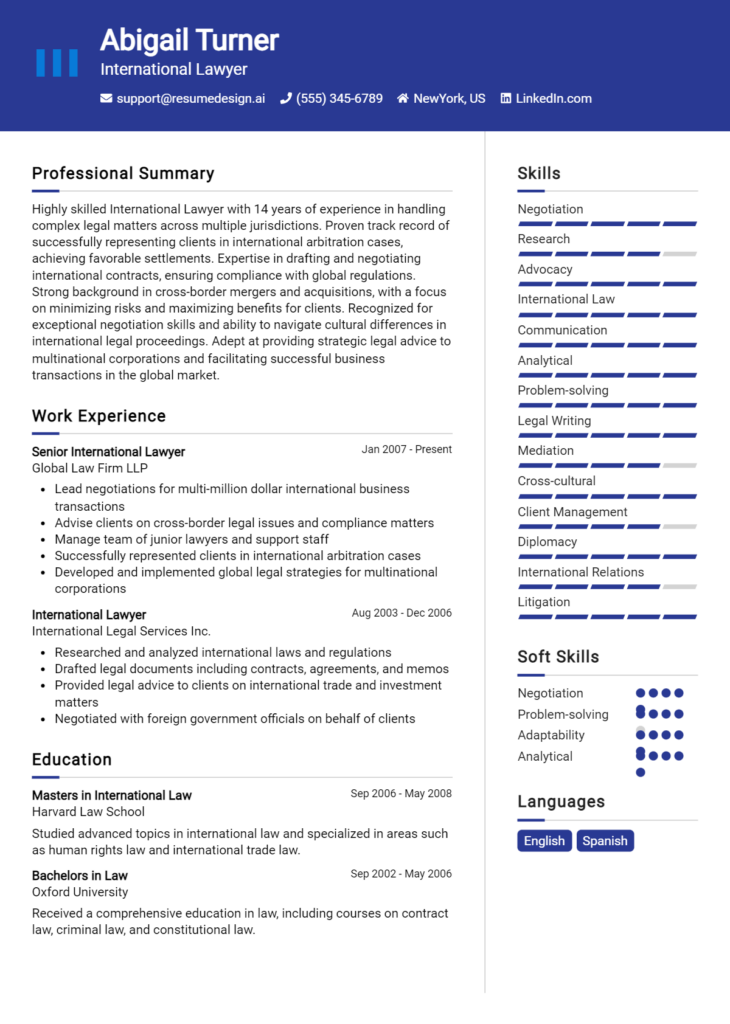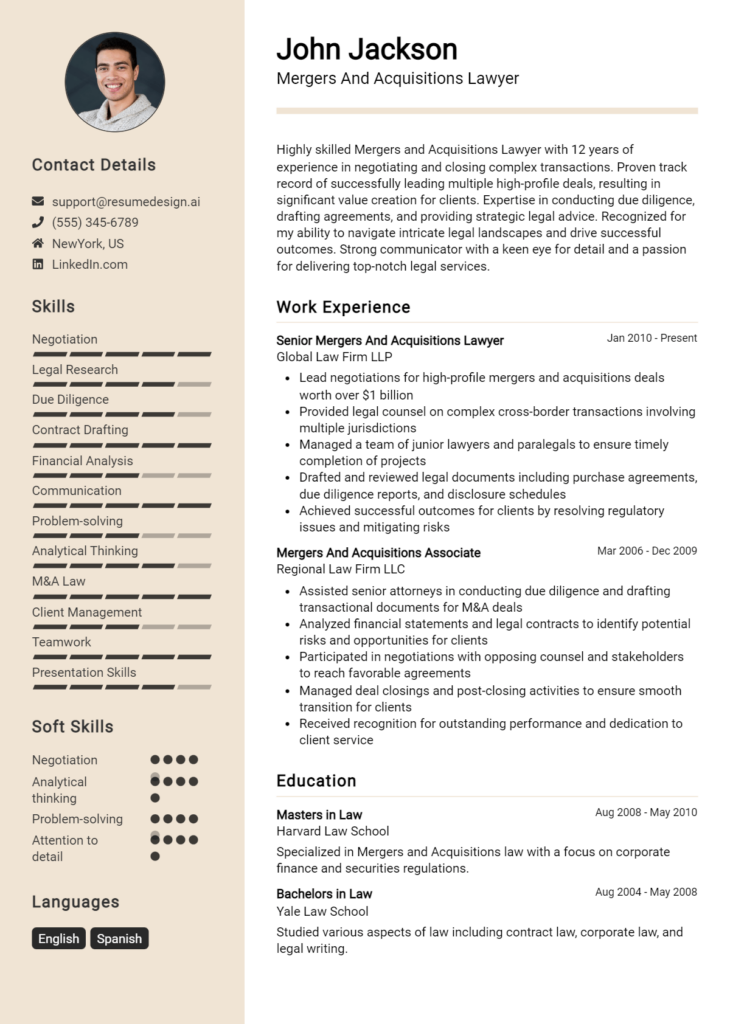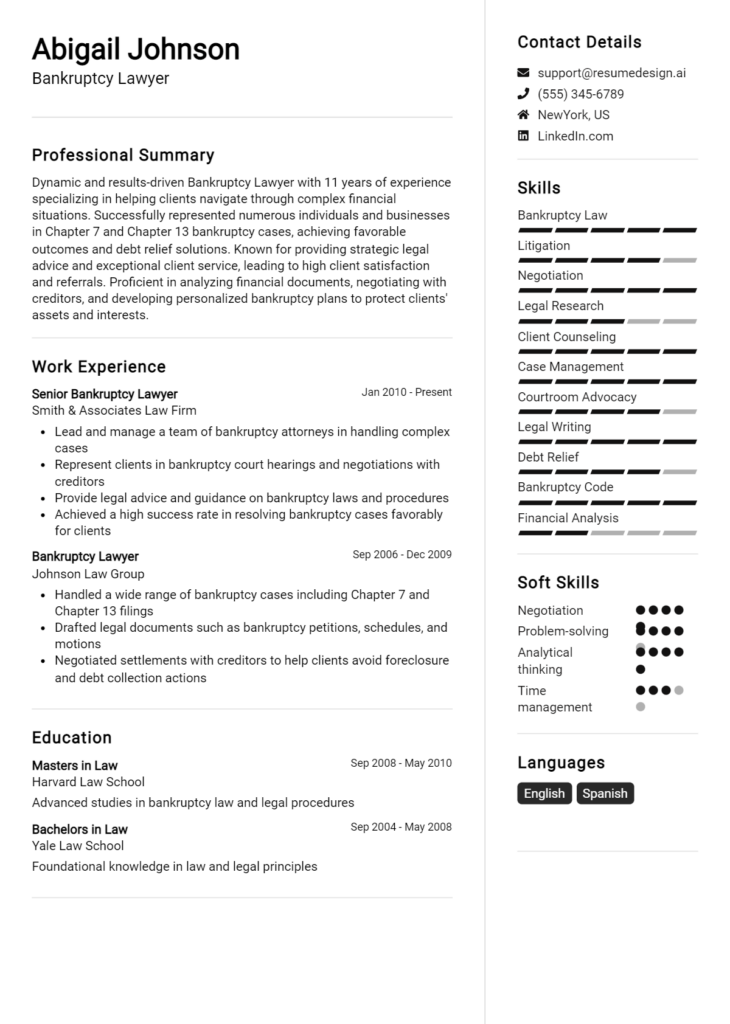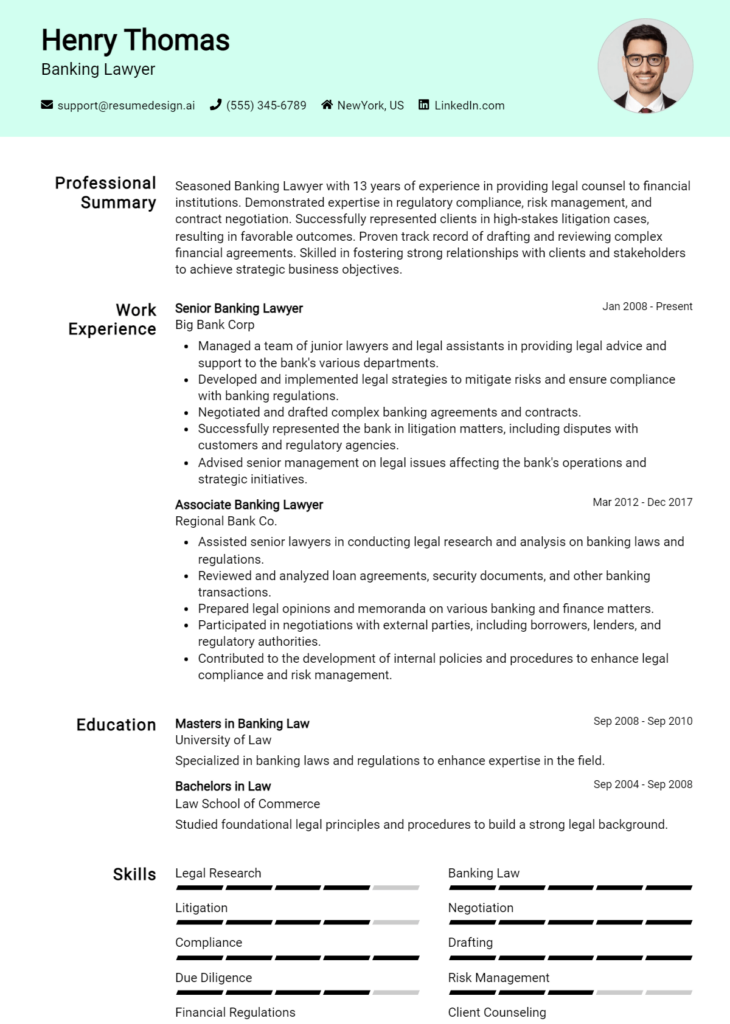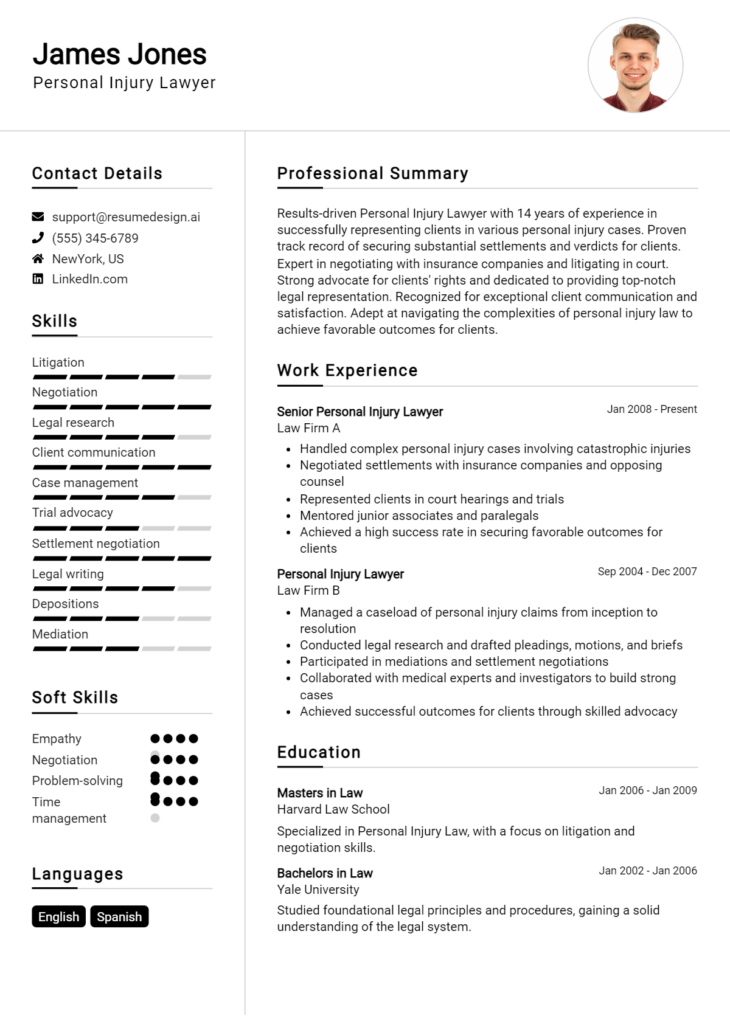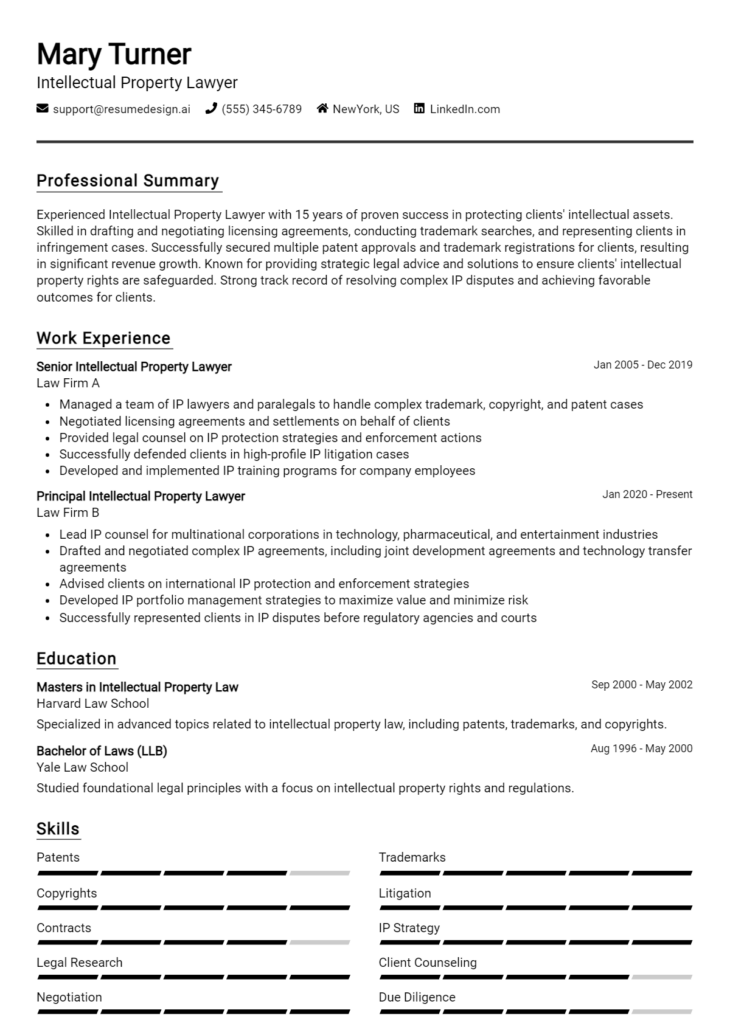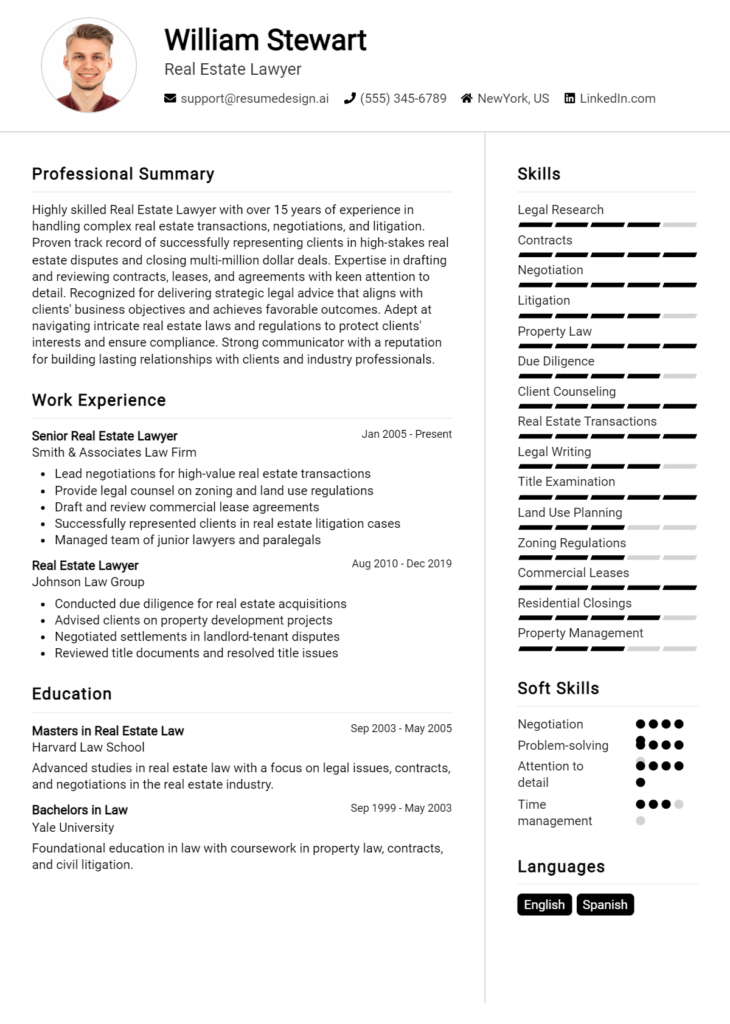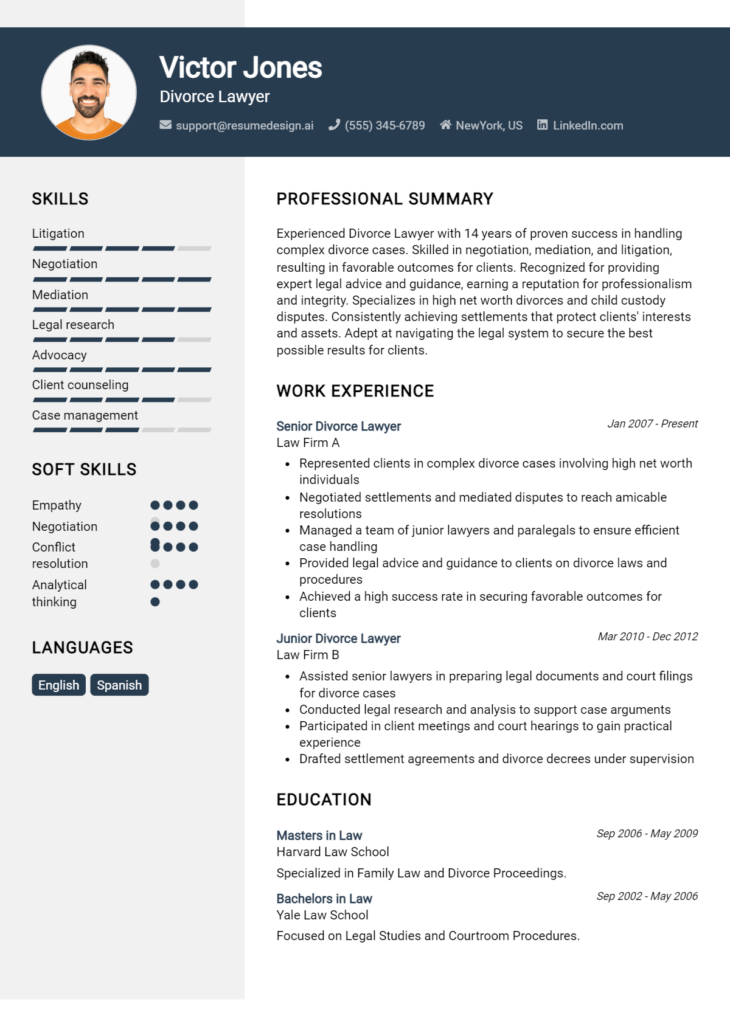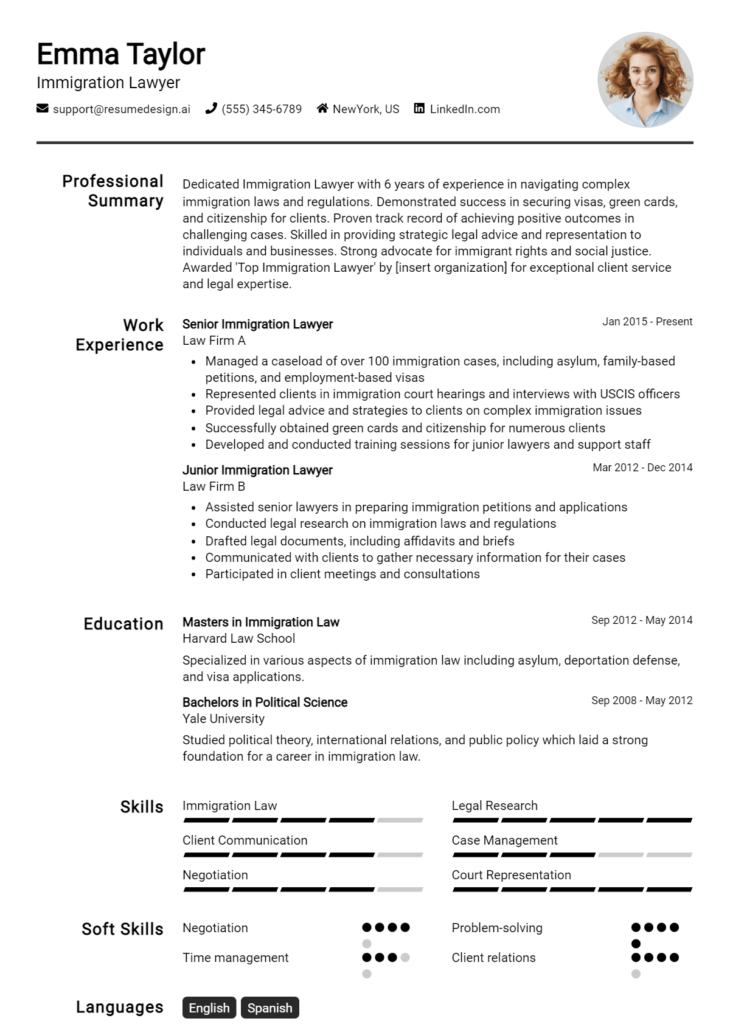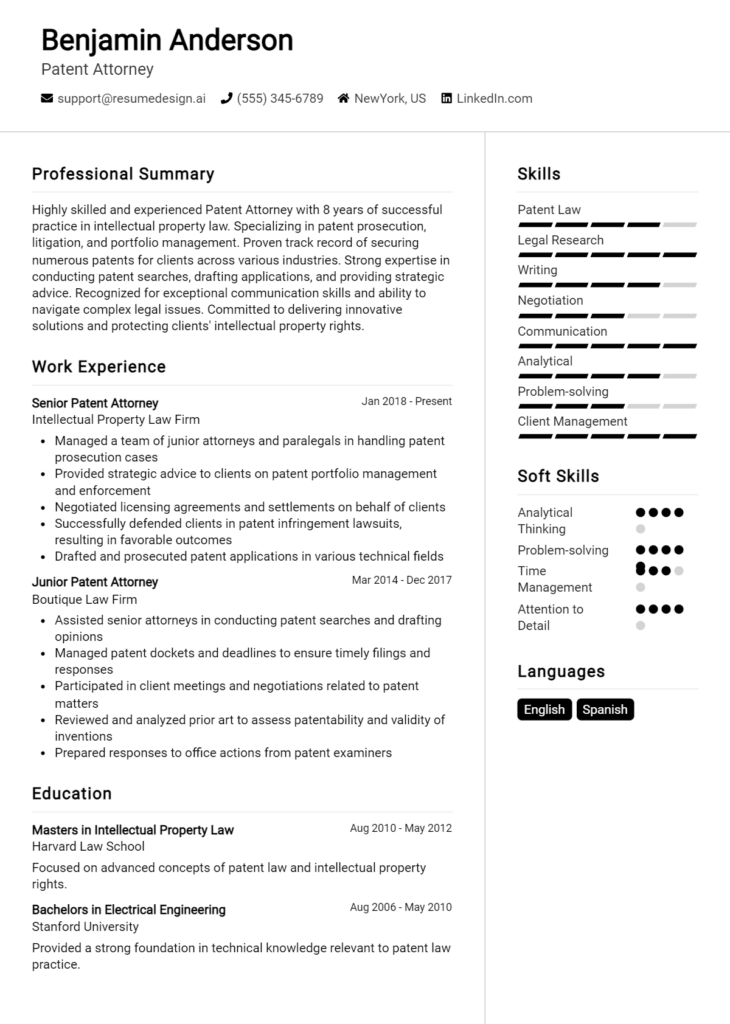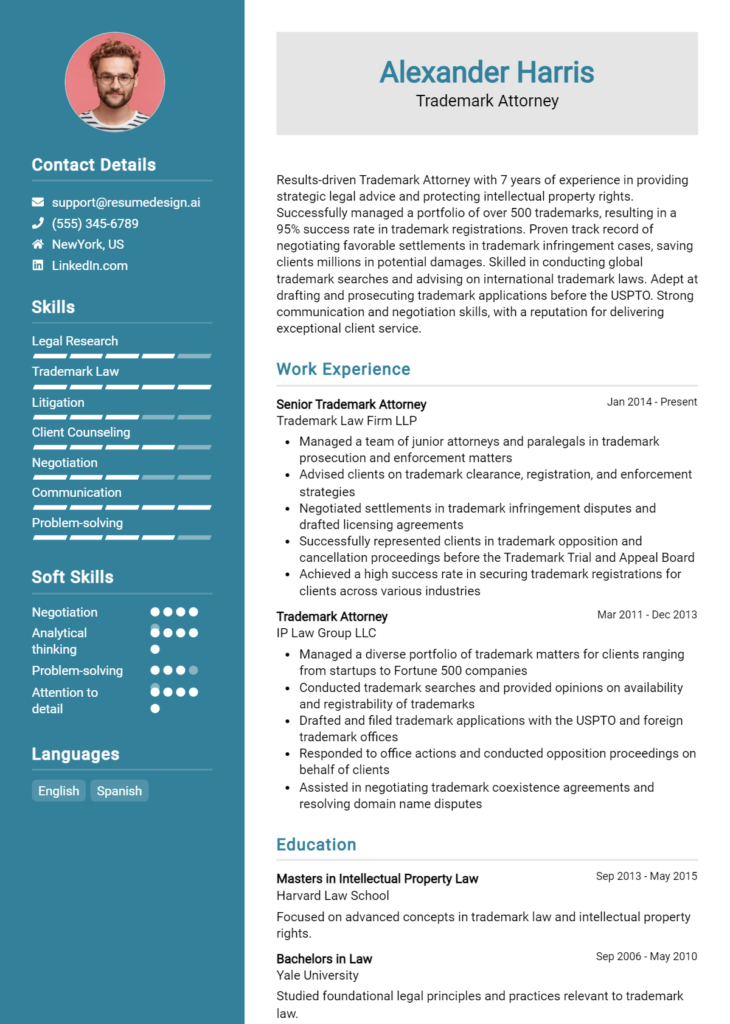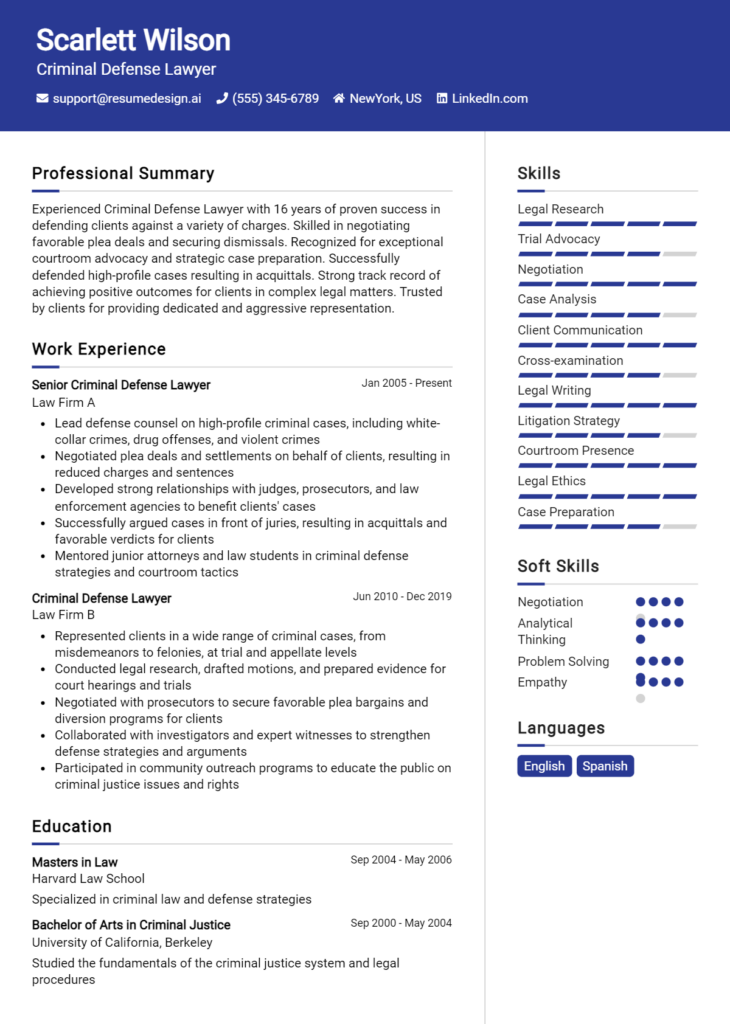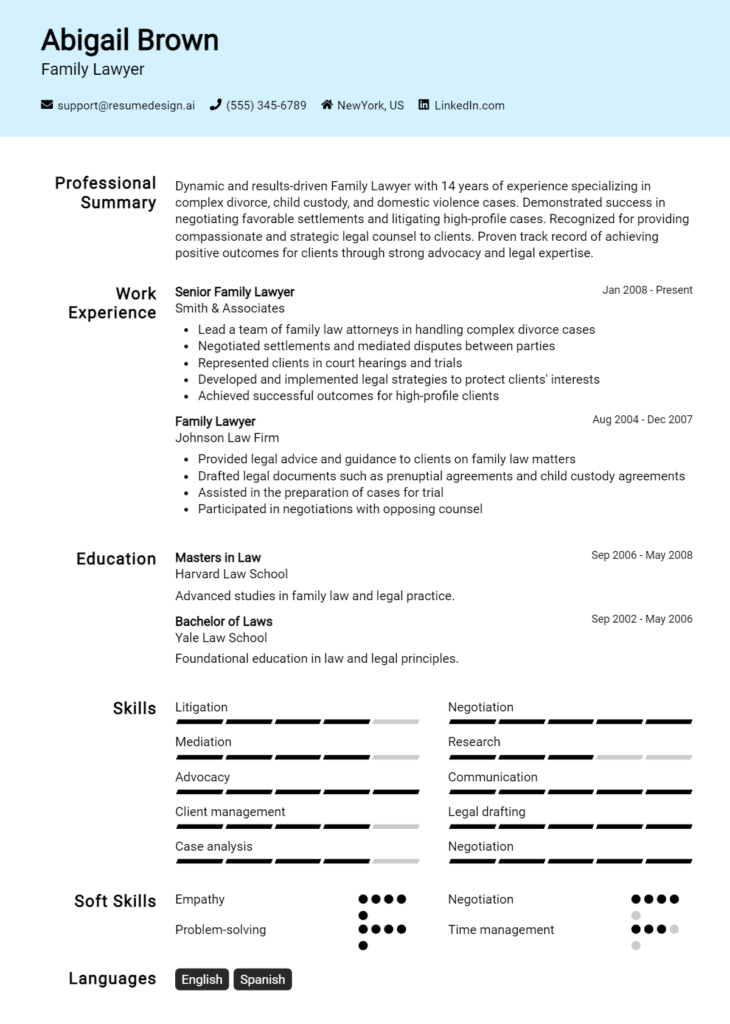Corporate Lawyer Core Responsibilities
A Corporate Lawyer plays a crucial role in navigating legal complexities within an organization, bridging various departments such as finance, compliance, and human resources. Key responsibilities include drafting and reviewing contracts, advising on regulatory issues, and representing the company in legal disputes. Essential skills encompass technical legal knowledge, operational insight, and strong problem-solving abilities, which contribute significantly to achieving the organization's objectives. A well-structured resume can effectively highlight these qualifications, enhancing a candidate's appeal to potential employers.
Common Responsibilities Listed on Corporate Lawyer Resume
- Drafting and negotiating contracts and agreements
- Providing legal advice on corporate governance
- Conducting due diligence for mergers and acquisitions
- Ensuring compliance with local, state, and federal laws
- Representing the company in litigation and arbitration
- Advising on intellectual property matters
- Researching and analyzing legal issues
- Developing and implementing corporate policies
- Training staff on legal compliance issues
- Collaborating with external legal counsel
- Preparing and filing legal documents
- Monitoring changes in legislation affecting the business
High-Level Resume Tips for Corporate Lawyer Professionals
In the competitive field of corporate law, a well-crafted resume is not just a document; it’s your first introduction to potential employers. It serves as a crucial tool to showcase your skills, achievements, and professional journey, making it imperative to present yourself in the best possible light. A strong resume reflects your expertise in navigating complex legal frameworks and highlights your ability to contribute to a corporate environment. This guide aims to provide practical and actionable resume tips specifically tailored for Corporate Lawyer professionals, ensuring that your first impression is a lasting one.
Top Resume Tips for Corporate Lawyer Professionals
- Tailor your resume to match the specific job description by incorporating relevant keywords and phrases.
- Begin with a strong summary statement that clearly outlines your experience and areas of specialization in corporate law.
- Highlight your legal experience prominently, focusing on roles that align with corporate law, such as mergers and acquisitions, compliance, or intellectual property.
- Quantify your achievements where possible, using metrics to demonstrate the impact of your work (e.g., “Successfully negotiated contracts worth over $10 million”).
- Showcase your industry-specific skills, such as regulatory compliance, risk management, and contract negotiation, making them easily identifiable.
- Include relevant certifications and licenses, such as your bar admission, as these validate your qualifications.
- Utilize bullet points for clarity and conciseness, ensuring each point emphasizes a specific skill or accomplishment.
- Keep the format clean and professional, using consistent fonts and spacing to enhance readability.
- Incorporate any relevant volunteer work or pro bono legal services that demonstrate your commitment to the legal profession and community.
By implementing these tips, you can significantly enhance the quality of your resume, increasing your chances of landing a job in the competitive field of corporate law. A thoughtful and strategically crafted resume will help you stand out among candidates, making it easier for hiring managers to see your potential contributions to their legal team.
Why Resume Headlines & Titles are Important for Corporate Lawyer
In the competitive field of corporate law, a well-crafted resume headline or title serves as a powerful first impression for potential employers. A strong headline can immediately capture the attention of hiring managers, providing a concise summary of a candidate's key qualifications in just a few impactful words. It is essential for the headline to be relevant to the specific job being applied for, as this relevance ensures that the candidate stands out in a crowded applicant pool. By encapsulating vital skills, experience, or accomplishments, a compelling headline sets the tone for the rest of the resume and invites further exploration of the candidate's credentials.
Best Practices for Crafting Resume Headlines for Corporate Lawyer
- Keep it concise: Aim for one to two impactful sentences.
- Be specific: Tailor the headline to reflect the specific role and industry.
- Highlight key skills: Incorporate essential skills or areas of expertise related to corporate law.
- Use action verbs: Start with strong action verbs to convey a sense of achievement.
- Include relevant credentials: Mention qualifications, certifications, or years of experience.
- Avoid jargon: Use clear and straightforward language to ensure readability.
- Focus on value: Convey the unique value you bring to potential employers.
- Test different headlines: Experiment with variations to find the most compelling option.
Example Resume Headlines for Corporate Lawyer
Strong Resume Headlines
Accomplished Corporate Lawyer Specializing in Mergers & Acquisitions with Over 10 Years of Experience
Results-Driven Legal Professional with Expertise in Commercial Contracts and Compliance
Dynamic Corporate Counsel with Proven Track Record in Risk Management and Corporate Governance
Weak Resume Headlines
Lawyer Looking for Opportunities
Experienced Professional in Legal Field
The strong headlines are effective because they clearly communicate the candidate's specific strengths and qualifications related to the corporate law field, making an immediate impact on the reader. They are tailored, descriptive, and highlight the unique contributions the candidate can bring to the role. In contrast, the weak headlines fail to impress as they are vague and lack specific information, leaving hiring managers with no compelling reason to engage further with the resume. By avoiding generic phrases, candidates can better position themselves as valuable assets to prospective employers.
Writing an Exceptional Corporate Lawyer Resume Summary
A resume summary is a critical component for a Corporate Lawyer as it serves as the first impression hiring managers will have of a candidate. An exceptional summary quickly captures attention by succinctly highlighting key skills, relevant experience, and notable accomplishments. This powerful snapshot sets the tone for the rest of the resume, encouraging hiring managers to delve deeper into the candidate's background. To be effective, the summary should be concise, impactful, and specifically tailored to the job being applied for, ensuring it resonates with the requirements of the position.
Best Practices for Writing a Corporate Lawyer Resume Summary
- Quantify achievements: Use numbers and metrics to demonstrate the impact of your work, such as successful deals closed or cases won.
- Focus on relevant skills: Highlight skills that align with the job description, such as contract negotiation, compliance, or litigation expertise.
- Tailor the summary: Customize the summary for each job application, addressing specific requirements and keywords from the job description.
- Keep it concise: Aim for 3-5 sentences that convey the most important points without overwhelming the reader.
- Use action-oriented language: Start sentences with strong action verbs to convey confidence and proactivity.
- Highlight industry experience: Mention any specific industries you have worked in, indicating your familiarity with sector-specific regulations or practices.
- Showcase career milestones: Include any prestigious awards, recognitions, or significant accomplishments that distinguish you from other candidates.
- Maintain a professional tone: Ensure the language is formal and appropriate for the legal profession, reflecting your professionalism and expertise.
Example Corporate Lawyer Resume Summaries
Strong Resume Summaries
Dynamic Corporate Lawyer with over 10 years of experience in corporate governance and contract negotiation, successfully managing over $200 million in mergers and acquisitions. Proven track record in reducing legal risks by 30% through proactive compliance strategies.
Results-oriented Corporate Counsel with expertise in intellectual property law and a history of securing favorable outcomes for clients. Achieved a 95% success rate in litigation cases, protecting client interests and enhancing brand value.
Detail-oriented Corporate Lawyer specializing in regulatory compliance and corporate restructuring. Successfully led a team in a major restructuring project, resulting in a 25% reduction in operational costs while ensuring adherence to legal standards.
Experienced Corporate Attorney with a strong focus on real estate transactions. Negotiated and closed deals worth over $150 million, while consistently achieving client satisfaction ratings above 90%.
Weak Resume Summaries
A dedicated Corporate Lawyer with experience in various legal matters looking for new opportunities.
Lawyer with knowledge of corporate law and a strong desire to help clients succeed.
The examples of strong resume summaries are effective because they provide specific details about achievements, skills, and experiences that are directly relevant to the Corporate Lawyer role. They quantify results and reflect a clear understanding of the position's demands. In contrast, the weak summaries lack specificity, fail to highlight any quantifiable achievements, and present an overly generic view that does not capture the candidate's potential value to employers.
Work Experience Section for Corporate Lawyer Resume
The work experience section of a Corporate Lawyer resume is critical as it serves as a testament to the candidate's technical acumen, leadership capabilities, and commitment to delivering high-quality legal solutions. This section not only highlights the candidate's familiarity with relevant laws and regulations but also demonstrates their ability to navigate complex legal landscapes, manage teams effectively, and produce results that align with industry standards. By quantifying achievements and ensuring that experiences resonate with the expectations of potential employers, candidates can significantly enhance their appeal in a competitive job market.
Best Practices for Corporate Lawyer Work Experience
- Clearly define your roles and responsibilities to emphasize technical expertise.
- Quantify achievements using metrics (e.g., percentage of successful cases, amount of money saved for clients).
- Highlight collaboration with cross-functional teams, illustrating your ability to work effectively with various stakeholders.
- Use industry-specific terminology to demonstrate familiarity with legal practices and standards.
- Focus on outcomes rather than tasks to showcase the impact of your contributions.
- Tailor your experiences to match the job description, ensuring relevance to the prospective employer.
- Include notable projects or transactions that demonstrate your leadership and negotiation skills.
- Keep descriptions concise and impactful to maintain the reader's attention.
Example Work Experiences for Corporate Lawyer
Strong Experiences
- Successfully negotiated a multi-million dollar merger, resulting in a 20% increase in client market share within the first year.
- Led a team of five attorneys in a high-stakes litigation case, achieving a favorable verdict that saved the client over $500,000 in potential damages.
- Developed and implemented a compliance program that reduced regulatory violations by 30%, enhancing the company’s reputation and reducing risks.
- Advised on the drafting and execution of over 100 contracts annually, ensuring 98% compliance with industry standards and reducing disputes.
Weak Experiences
- Worked on various legal documents without specifying any outcomes or contributions.
- Assisted in contract reviews and negotiations, but without quantifying impacts or responsibilities.
- Participated in team meetings to discuss cases, lacking any mention of personal contributions or results.
- Handled legal research for multiple cases without clarifying the relevance or effectiveness of the research provided.
The experiences classified as strong clearly articulate specific achievements, quantifiable outcomes, and demonstrate effective collaboration, thereby providing a compelling narrative of the candidate's capabilities. In contrast, the weak experiences suffer from ambiguity and lack of measurable impact, making it difficult for potential employers to gauge the candidate's true value and contribution to previous roles.
Education and Certifications Section for Corporate Lawyer Resume
The education and certifications section of a Corporate Lawyer resume plays a crucial role in presenting the candidate's qualifications to potential employers. It not only sheds light on the applicant's academic achievements but also underscores their industry-relevant certifications and commitment to continuous learning. By providing details about relevant coursework, specialized training, and recognized credentials, candidates can significantly enhance their credibility, demonstrating their preparedness for the complexities of corporate law and their alignment with the requirements of the job role.
Best Practices for Corporate Lawyer Education and Certifications
- Prioritize relevant degrees such as Juris Doctor (JD) from an accredited law school.
- Include industry-recognized certifications, such as Certified Corporate Counsel (CCC) or other relevant legal certifications.
- Detail any specialized training in corporate governance, mergers and acquisitions, or compliance law.
- Highlight relevant coursework that showcases expertise in corporate law subjects.
- Maintain a clear and concise format to make this section easy to read.
- List educational achievements in reverse chronological order, starting with the most recent.
- Consider including honors or awards that emphasize legal acumen, such as academic scholarships or law review memberships.
- Regularly update this section to reflect any new qualifications or continuing education efforts.
Example Education and Certifications for Corporate Lawyer
Strong Examples
- Juris Doctor (JD), Harvard Law School, 2020
- Certified Corporate Counsel (CCC), Association of Corporate Counsel, 2021
- Specialized Training in Mergers and Acquisitions, Corporate Law Institute, 2022
- Relevant Coursework: Corporate Finance, Securities Regulation, and Contract Law
Weak Examples
- Bachelor of Arts in History, State University, 2018
- Generic Legal Certificate, Online Learning Platform, 2020
- Certification in Public Speaking, Community College, 2019
- Outdated coursework: Introduction to Legal Studies, 2017
The strong examples are considered effective because they directly align with the qualifications needed for a Corporate Lawyer role, showcasing advanced degrees and relevant certifications that demonstrate a clear commitment to the field. In contrast, the weak examples lack relevance to corporate law, featuring outdated or unrelated qualifications that do not bolster the candidate's suitability for the position. This highlights the importance of tailoring educational credentials to meet the specific demands of the job.
Top Skills & Keywords for Corporate Lawyer Resume
In the competitive field of corporate law, having a well-crafted resume that highlights both hard and soft skills is crucial for standing out to potential employers. Corporate lawyers navigate complex legal landscapes, requiring a combination of technical knowledge and interpersonal abilities. By effectively showcasing these skills, candidates can demonstrate their value and readiness to tackle the challenges of the role. A strong emphasis on relevant skills not only enhances the resume but also aligns with the expectations of hiring managers seeking competent legal professionals. For those looking to create a compelling resume, understanding the importance of skills is essential in portraying expertise and adaptability in a dynamic work environment.
Top Hard & Soft Skills for Corporate Lawyer
Soft Skills
- Strong Communication Skills
- Negotiation Abilities
- Analytical Thinking
- Problem Solving
- Attention to Detail
- Team Collaboration
- Time Management
- Client Relationship Management
- Adaptability
- Critical Thinking
- Ethical Judgment
Hard Skills
- Contract Drafting and Review
- Legal Research Proficiency
- Knowledge of Corporate Law
- Regulatory Compliance
- Litigation Experience
- Intellectual Property Law
- Mergers and Acquisitions Expertise
- Risk Management
- Financial Acumen
- Proficiency in Legal Software
- Document Management
- Familiarity with Alternative Dispute Resolution
- Due Diligence Processes
For more information on how to effectively highlight your skills, check out this skills resource. Additionally, exploring your work experience can further enhance your resume's impact, showcasing how your skills have been applied in previous roles.
Stand Out with a Winning Corporate Lawyer Cover Letter
Dear [Hiring Manager's Name],
I am writing to express my interest in the Corporate Lawyer position at [Company Name], as advertised on [where you found the job listing]. With a Juris Doctor degree from [Your Law School] and over [X years] of experience in corporate law, I have developed a robust skill set that includes contract negotiation, compliance, and risk management. I am particularly drawn to this opportunity at [Company Name] because of its commitment to innovation and excellence in the corporate sector, and I am eager to contribute to your legal team’s success.
In my previous role at [Previous Company Name], I successfully led multiple high-stakes mergers and acquisitions, providing legal guidance that not only ensured compliance with regulatory standards but also strategically aligned with the company’s long-term goals. My ability to analyze complex legal issues and communicate them clearly to non-legal stakeholders has been critical in fostering collaborative relationships across departments. I take pride in my attention to detail and my proactive approach to identifying potential legal risks before they escalate, which has saved my clients significant resources and time.
I am particularly impressed by [specific project or value of the company], and I see a strong alignment between my professional goals and the mission of [Company Name]. I am excited about the prospect of working in an environment that prioritizes ethical standards and corporate responsibility. I am confident that my expertise in corporate law, combined with my commitment to delivering exceptional legal services, will make a valuable addition to your esteemed team.
Thank you for considering my application. I look forward to the opportunity to discuss how my background, skills, and enthusiasms align with the needs of [Company Name]. I am eager to bring my passion for corporate law to your organization and help navigate the complexities of the corporate landscape.
Sincerely,
[Your Name]
[Your Contact Information]
[Your LinkedIn Profile or Website, if applicable]
Common Mistakes to Avoid in a Corporate Lawyer Resume
When applying for a position as a corporate lawyer, your resume serves as a crucial first impression to potential employers. A well-crafted resume can highlight your qualifications and experiences, but common mistakes can detract from your professional image and may lead to missed opportunities. Below are some prevalent pitfalls to avoid when constructing your corporate lawyer resume:
Overly Complex Language: Using legal jargon or convoluted phrasing can confuse hiring managers. Keep your language clear and concise to ensure your qualifications are easily understood.
Lack of Tailoring: Failing to customize your resume for each job application can make it appear generic. Tailor your resume to reflect the specific skills and experiences relevant to the job description.
Ignoring Formatting: A cluttered, unorganized resume can be off-putting. Use consistent formatting, such as headings, bullet points, and font sizes, to create a professional appearance.
Listing Duties Instead of Achievements: Simply stating your responsibilities doesn’t showcase your impact. Focus on specific accomplishments and quantify your successes to demonstrate your value.
Neglecting Soft Skills: Corporate law isn’t just about hard skills; soft skills like negotiation, communication, and teamwork are equally important. Highlight these abilities in addition to your legal expertise.
Including Irrelevant Experience: Listing jobs or experiences that don’t relate to corporate law can dilute your resume. Focus on relevant legal work, internships, or involvement in related extracurricular activities.
Failing to Proofread: Typos and grammatical errors can undermine your professionalism. Always proofread your resume, or ask a colleague to review it for clarity and accuracy.
Omitting Professional Development: Not mentioning continuing education, certifications, or relevant courses can make your resume seem dated. Include any ongoing legal education to demonstrate your commitment to staying current in the field.
Conclusion
As a corporate lawyer, you play a crucial role in navigating the complex legal landscape that businesses operate within. Throughout this article, we explored the essential skills and qualifications necessary for success in this field, including strong analytical abilities, effective communication skills, and a deep understanding of corporate law and regulations. We also highlighted the importance of continuous education and staying updated on legal trends to maintain a competitive edge.
In addition to these skills, having a well-crafted resume is vital for standing out in a competitive job market. Your resume should effectively showcase your experience, legal expertise, and unique contributions to past employers. It is important to tailor your resume to reflect the specific requirements of the corporate law positions you are targeting.
To enhance your resume and ensure it meets industry standards, take advantage of the resources available to you. Consider using resume templates to create a polished layout, or utilize a resume builder for an easy and efficient way to format your information. Reviewing resume examples can provide inspiration and insight into what works well in your field. Additionally, don’t overlook the importance of a strong cover letter—check out the cover letter templates to help you craft a compelling introduction to your resume.
Now is the time to take action! Review your corporate lawyer resume to ensure it accurately represents your skills and experiences. Utilize the tools mentioned above to create a standout application that will capture the attention of potential employers. Your next opportunity in corporate law awaits—make sure you’re ready to seize it!

